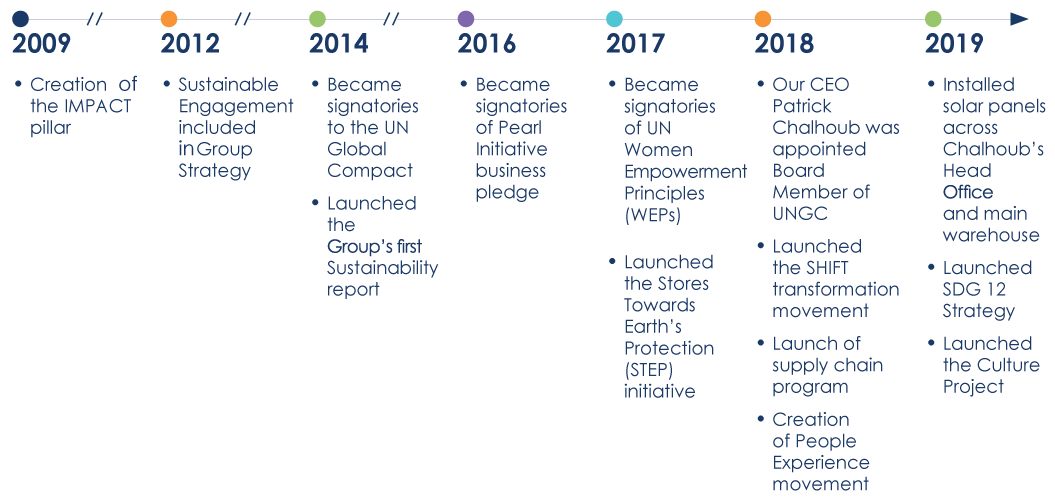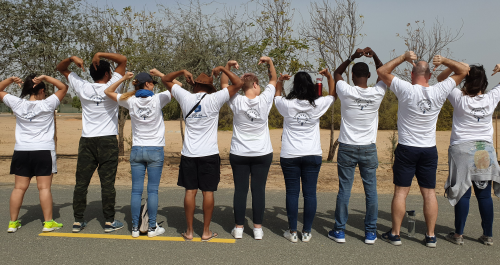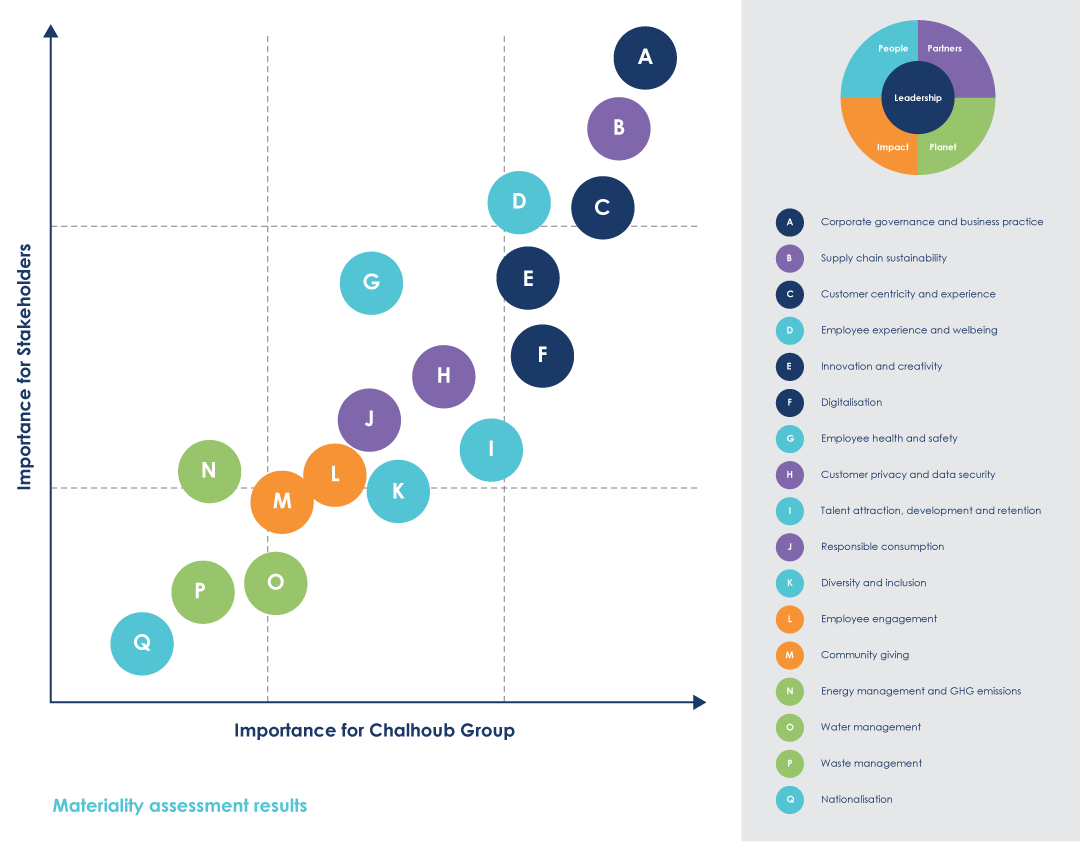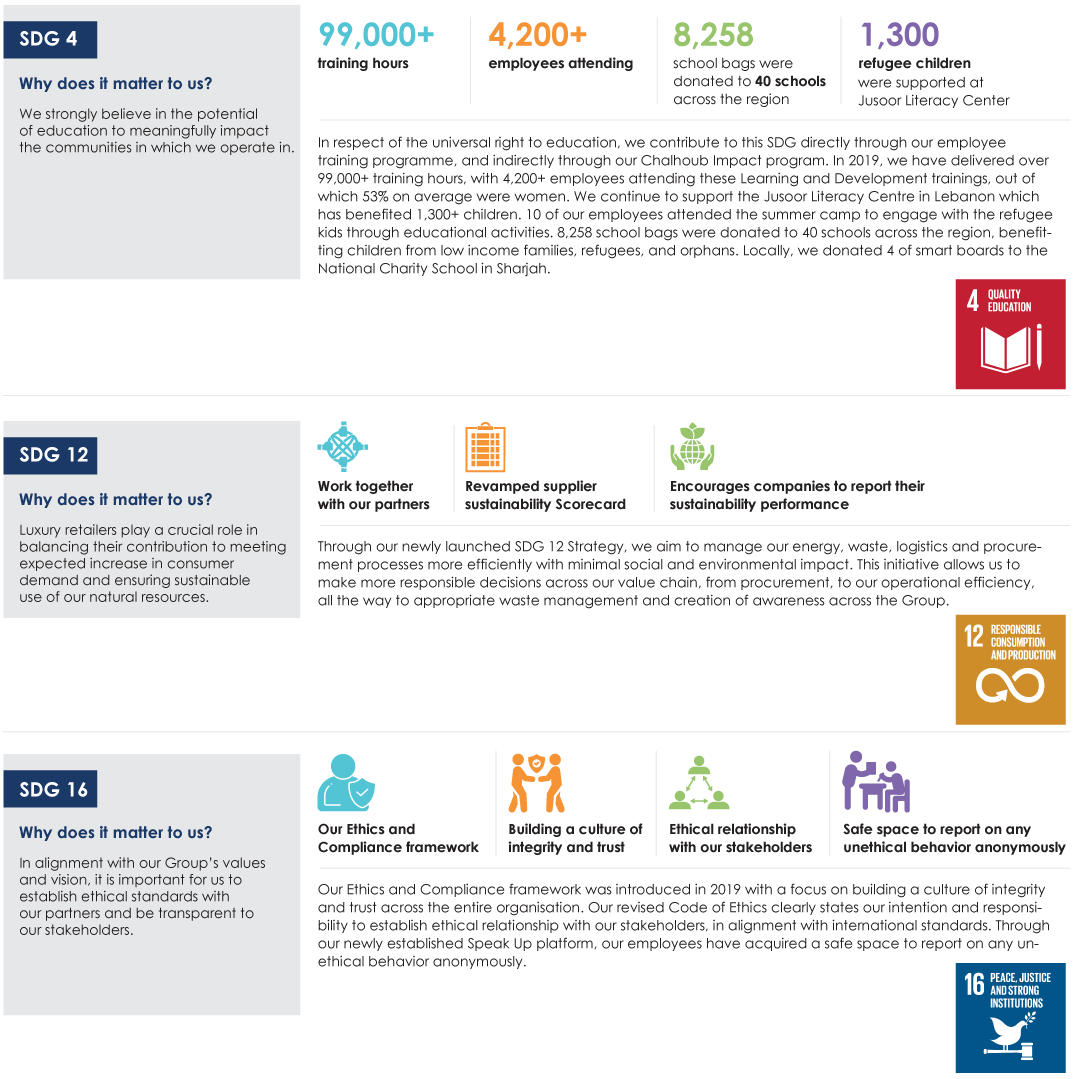Setting the foundation for a sustainable business, in alignment to global and local call for action.
Central to our vision of becoming a hybrid luxury retailer is keeping our people at heart, upholding the highest standards of integrity and adopting a culture ready for transformation.”
Chalhoub Group is committed to collaborating with all our stakeholders towards a sustainable future. Our focus for 2019 has been to strengthen our supply-chain sustainability by working together with our partners. We continue to create an inclusive workforce culture for our employees to thrive in, enabling them to deliver the best experience for our customers. We are also conscious of our own impact on the environment and have continued our shift to renewable energy and optimisation of natural resources consumption to reduce our footprint, including a plan to ban single use plastic within our company by 2021.”

Our Mission
To help build a strong and
sustainable business and community.
Our Values
Respect, Excellence,
Enterpreneurial Spirit.

Due to the increasingly fast-paced world which we are subject to, competition has never been more demanding. Being environmentally conscious while simultaneously meeting the expectations of our growing customer base is not an easy task when trying to retain a competitive advantage. To overcome this challenge and to stay ahead of the curve in the coming years, we are determined to meet each of our 2020 targets, focusing our improvements on agility, resilience to disruption and climate-related risks, while remaining customer-centric.
|
Pillar |
2020 Targets * |
2017 |
2018 |
2019 |
|---|---|---|---|---|
|
Leadership |
50% of our employees use our online training |
- |
32% |
39% |
|
20 'Ibtikar' business ideas in funding (in total) |
- |
5 |
16 |
|
|
15% of hybrid revenue from e-commerce platforms |
- |
3% |
3.3% |
|
|
People |
50% women in middle management |
43% |
49% |
53% |
|
25% women in senior management |
22% |
22% |
25% |
|
|
Hire at least 30 women in our warehouses (in total) |
- |
22 |
25 |
|
|
4.5% Emirati nationals in workforce |
2.0% |
2.3% |
4.2% |
|
|
Increase maternity leave to 90 days |
70 days |
70 days |
90 days |
|
|
Increase paternity leave to 5 days |
3 days |
5 days |
14 days |
|
|
Zero recordable injuries |
2 |
2 |
2 |
|
|
Partners |
400 suppliers completed the Supplier Sustainability Scorecard |
192 |
208 |
354 |
|
Planet ** |
194 XStores equipped shops |
1 |
4 |
173 |
|
Reduce electrical energy consumption by 15% against 2016 baseline |
1.90% |
-7.00% |
-6.7% |
|
|
Increase electricity consumption from renewables to 30% |
N/A |
N/A |
11% |
|
|
Reduce carbon emissions by 15% against 2016 baseline |
0.60% |
-14.70% |
-20% |
|
|
Reduce utility water consumption by 15% against 2016 baseline |
23.70% |
10.40% |
30% |
|
|
Reduce office paper consumption by 25 % against 2016 baseline |
-32.6% |
-40.70% |
-64% |
|
|
Increase percentage of stores assessed to 90% (UAE, KSA, Kuwait, & Bahrain) |
78% |
91% |
100% |
|
|
Increase percentage of stores who obtained STEP certification to 80% in the UAE |
65% |
59% |
100% |
|
|
Impact |
Increase number of volunteers by 20% against 2016 baseline |
8.60% |
14.80% |
52% |
|
Increase the number of people supported by impact initiatives by 25% against 2016 |
11.50% |
17.60% |
40.7% |
Note:
* This report covers our operation in the UAE from 1 January 2019 to 31 December 2019, unless otherwise indicated.
** The Planet data related to energy, water, paper and carbon footprint reported above relates to back-office activities of Chalhoub Group in the UAE.
We value our relationships with our stakeholders, and we engage with them regularly to better understand which sustainability issues matter to them.
Prioritising Key Issues
In 2018, we engaged with our key stakeholders to assess our Group’s material issues. Results of this analysis have in turn shaped our sustainability strategy and allowed us to report on issues that are important to our people, customers, partners and communities.
Materiality Results
We carry out a new materiality analysis every three years to keep up to date with issues that matter most to our Group sustainable development. Our last materiality session was conducted in 2018, and we plan to carry out our next materiality session in 2021. The results of the materiality analysis conducted last year are still relevant to year 2019 and 2020.

In our materiality matrix, we have listed the issues in order of importance to our Group and stakeholders. On the y-axis, we have attributed the importance that our stakeholders place on the different sustainability topics, while the x-axis represents the importance of these topics to our Group. We have also identified where each material issue falls into each pillar of our Group’s sustainability strategy. The issues we have prioritised in 2018 are expressed through the different initiatives carried out from 2018 until now, and for the upcoming year.
Our sustainability initiatives are part of a bigger picture. We have aligned our strategy with both local and international frameworks including the United Nation Sustainable Development Goals (UN SDGs), the United Nation Global Compact (UNGC) principles, the United Nation Women’s Empowerment Principles (WEPs), and Dubai Plan 2021.
The United Nations Sustainable Development Goals


The Ten Principles of the United Nations Global Compact
In 2018, our CEO was appointed a member of the Board of the UN Global Compact (UNGC). We are committed to the UNGC 10 principles and we aim to continue working with our partners to achieve our goals.
|
UNGC Principles |
Report links | |
|---|---|---|
|
Human Rights |
|
|
|---|---|---|
|
1. |
Businesses should support and respect the protection of internationally proclaimed human rights. |
|
|
2. |
Businesses should make sure that they are not complicit in human rights abuses. |
|
|
Labour |
|
|
|---|---|---|
|
3. |
Businesses should uphold the freedom of association and the effective recognition of the right to collective bargaining. |
Collective bargaining is prohibited in the GCC |
|
4. |
Businesses should uphold the elimination of all forms of forced and compulsory labour. |
|
|
5. |
Businesses should uphold the effective abolition of child labour. |
|
|
6. |
Businesses should uphold the elimination of discrimination in respect of employment and occupation. |
|
|
Environment |
|
|
|---|---|---|
|
7. |
Businesses should support a precautionary approach to environmental challenges. |
Energy Management and GHG Emissions Waste Minimisation and Recycling Program Water Management |
|
8. |
Businesses should undertake initiatives to promote greater environmental responsibility. |
Energy Management and GHG Emissions Waste Minimisation and Recycling Program Water Management |
|
9. |
Businesses should encourage the development and diffusion of environmentally friendly technologies. |
Energy Management and GHG Emissions Waste Minimisation and Recycling Program Water Management |
|
Anti-Corruption |
|
|
|---|---|---|
|
10. |
Businesses should work against corruption in all its forms, including extortion and bribery. |
|
The United Nations Women’s Empowerment Principles
Women comprise most of our customer base and are a large part of our employee workforce. We are committed to uphold the UN Women’s Empowerment Principles. We hope to continue driving fairness and equal opportunity in the work place for all.
|
UN Women's Empowerment Principles |
Report links | |
|---|---|---|
|
1. |
Establish high-level corporate leadership for gender equality |
|
|
2. |
Treat all women and men fairly at work – respect and support human rights and non-discrimination. |
|
|
3. |
Ensure the health, safety and well-being of all women and men workers |
|
|
4. |
Promote education, training and professional development for women |
|
|
5. |
Implement enterprise development, supply chain and marketing practices that empower women |
|
|
6. |
Promote equality through community initiatives and advocacy |
|
|
7. |
Measure and publicly report on progress to achieve gender equality |
|
The Dubai Plan 2021
Dubai Plan 2021 is composed of 6 pillars, each highlighting the strategic development goals for Dubai, and together forming the city’s vision for 2021. To support the environment and the community in which we work in, we align our activities to this plan.
|
Themes |
Report links |
|---|---|
|
The People: “City of Happy, Creative and Empowered People” |
|
|
The Society: “An Inclusive & Cohesive Society” |
Diversity and Inclusion Nationalisation and Cultural Programs |
|
The Experience: “The Preferred Place to Live, Work & Visit” |
Customer Centricity and Experience People Experience & Wellbeing Talent Management |
|
The Place: “A Smart & Sustainable City” |
Energy Management and GHG Emissions Waste Minimisation and Recycling Program Water Management |
|
The Economy: “A Pivotal Hub in the Global Economy” |
Customer Centricity and Experience Innovation and Creativity Digitalisation and Transformation |
|
The Government: “A Pioneering and Excellent Government” |
Sustainable use of resources and responsible practices should be at the center of every company's social responsibility. At Chalhoub Group, we are proud to have put in place some of those forward-thinking practices, notably on the newly implemented environmental policy and supplier scorecard, which will allow us to ensure we also work with the most socially responsible suppliers. We hope to see more companies in the region follow our lead in the implementation of sustainable practices.”
Our company prides itself on being a family-run business. We therefore strive to exhibit family values, one of which is caring. We care not only for our people but also for the communities that surround us. To do so, we engage in several missions to respond to the needs of our surroundings.”